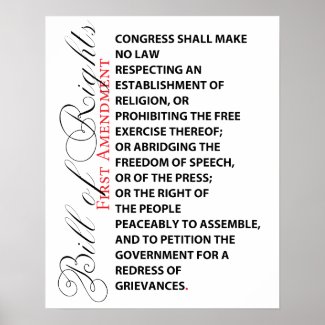 |
| North County Christian Church, Paso Robles © B. Radisavljevic |
The first colonists did not always tolerate dissent within their colonies, either, and some were banished from very strict colonies. Some states established their own state churches, which received government support, but it was a big country and there was always somewhere to move to. Many new colonies were established by religious refugees who had been banished from other colonies. Most of those who settled on the East Coast were Protestants, though there were also Catholics there. The Southwest was mostly Catholic, due to the influence of the Catholic Missions. Later Protestant missionaries arrived in the Northwest.
When it came time to write the Constitution, the founders did agree on one thing -- freedom of conscience. The new country would not be allowed to establish a national, government-supported church. Quakers, Baptists, Catholics, Calvinists, Anabaptists, Methodists, Jews and all other religious groups could practice their religions without government interference unless their beliefs were against the National Interest. One example of this was the Mormon practice of polygamy, which was made illegal. People were free to worship or not to worship when and where they wished.
At the time the Constitution was written, it was assumed that if you did practice a religion, unless you were a Native American, you would worship the Judeo-Christian God of the Bible, even if other holy books were considered to be important add-ons. Even those who called themselves deists quoted the Bible. Religious freedom was so important to the founders that in order to be ratified, the first ten amendments, known as the Bill of Rights, had to be added to address the freedoms people thought most important. The First Amendment guaranteed freedom of religion, freedom of speech, freedom of the press, freedom of assembly, and freedom to petition the government for redress of wrongs.
Regarding freedom of religion, the Constitution left no doubt. Congress could make no law to establish a national religion. Neither could it prohibit the free exercise of religion. The supreme Court has been called on to make decisions about the expression of religious liberty and what exactly violates the establishment clause. More cases continue to go to court as the United States becomes more religiously diverse. Things that never used to be an issue, such as students wearing jewelry with religious symbols or bringing Bibles to school have now become issues, as has the wearing of headscarves by Muslim students.
Today it seems the government is limiting free exercise of religion in a way the founders never intended. What vital interest of the state is violated if a group of Christian students want to get together to pray during lunch hour by themselves without any faculty member involved? Do these students lose both their freedom to exercise their religion and their freedom to assemble just because they are on school property during school hours? And why are there special prayer rooms in some public schools for the use of Muslim students when this is sometimes denied to Christian students? The American Civil Liberties Union has summarized the current laws applicable to religion in public schools here, but also state that some school teachers and administrators still seem unaware of these rulings.
For the past 240 years, the diverse religions in the United States did a pretty fair job of tolerating each other and even on occasion working together to help others. Those of one religion did often try to persuade those of another or no religion to believe as they did, but this was through a verbal exchange of ideas. If a Mormon missionary or Baptist or Jehovah's Witness appears at your door, you do not have to open it or get into a discussion if you don't want to. They still have the right to ring your doorbell, but most won't if you have a sign stating solicitors aren't welcome.
 |
| Cross atop St. Rose Church, Paso Robles © B. Radisavljevic |
Jesus told Pilate that his kingdom was not of this world. Jews are not seeking a theocracy, either. Islamic extremists, though, are seeking political as well as religious power, and some mosques in America are supporting jihad. We saw evidence of that in California around Thanksgiving. It is very easy for an extremist religion to use our freedom of religion in America against us in the quest to overthrow our Constitution. We need to ponder these issues as we celebrate Religious Freedom Day.



No comments:
Post a Comment